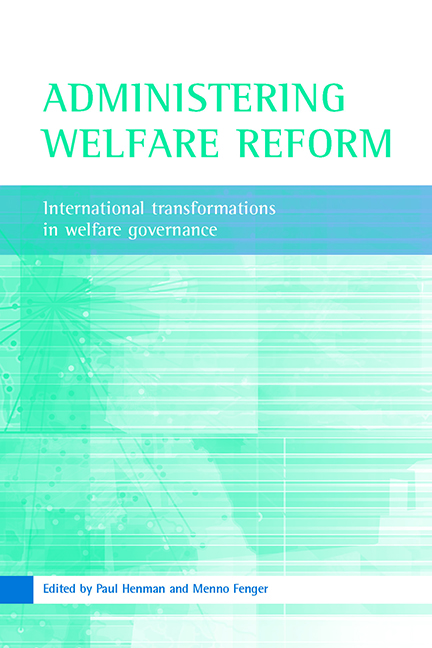Book contents
- Frontmatter
- Contents
- List of tables
- Preface
- Acknowledgements
- List of abbreviations
- Notes on contributors
- one Introduction: administering welfare reform
- two Welfare reform as governance reform: the prospects of a governmentality perspective
- Part One Participants: reforming the agents of welfare delivery
- Part Two Practices: the welfare governance of street-level practices
- Part Three Processes: the changing spaces of welfare governance
- Index
- Also available from The Policy Press
eight - The administration of transformation: a case study of implementing welfare reform in the UK
Published online by Cambridge University Press: 14 January 2022
- Frontmatter
- Contents
- List of tables
- Preface
- Acknowledgements
- List of abbreviations
- Notes on contributors
- one Introduction: administering welfare reform
- two Welfare reform as governance reform: the prospects of a governmentality perspective
- Part One Participants: reforming the agents of welfare delivery
- Part Two Practices: the welfare governance of street-level practices
- Part Three Processes: the changing spaces of welfare governance
- Index
- Also available from The Policy Press
Summary
It is relatively uncontroversial to suggest that the delivery of frontline services to the unemployed in the UK has been altered dramatically by a combination of reforms to the substance of policy and changes in the governance arrangements concerning the conditions and mechanisms of implementation. However, the significance and impact of these reforms have tended to be either evaluated at a macro-level or inferred from the preponderance of discourse surrounding change. The aim for this chapter is to provide a micro-level analysis of unemployment policy in practice that assesses the significance of change, along with its extent and character, from the perspectives of frontline staff and unemployed service users. This approach is based on the premise that ‘policies cannot be understood in isolation from the means of their execution’ (Elmore, 1978, p 185), meaning that policy does not fully exist until the social actors who deliver and receive policy bring it into being. Implementation is not simply a peripheral matter of technicality or practicality, but is central to understanding the constitution of what policies are and what they mean to people. The emphasis is, therefore, on how welfare reform and new governance are accomplished and emerge in street-level practice.
The question that this chapter aims to answer is: what does new governance mean to the frontline workers of employment services and to the users of unemployment benefits and services in the UK? The chapter is divided into two main parts. The first part examines changes to the rules of the game from the perspective of frontline staff. It begins with an overview of key changes in employment services in terms of the style of governance and policy content. The focus is on how changes in the late 1990s affected frontline staff in their everyday work with service users. Several pressures, constraints and tensions are identified, which in some cases led to discrepancies between the official and implemented forms of policy, thereby reducing the impact of reforms. The second part of the chapter considers reform from the perspective of unemployed users, focusing on the alteration of the language of the game through the formal redefinition of welfare subjects as ‘customers’. This time the gap between policy and practice was rhetorical, with users being represented formally by a label that they neither recognised nor appreciated.
- Type
- Chapter
- Information
- Administering Welfare ReformInternational Transformations in Welfare Governance, pp. 161 - 182Publisher: Bristol University PressPrint publication year: 2006
- 1
- Cited by

